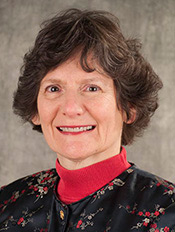Researcher outlines life-course perspective to cancer prevention


Cancer today impacts people of all ages, however, an increased risk of cancer can be due to genetics, environmental factors, or lifestyle choices. This makes identifying effective strategies to prevent cancer especially difficult. Although there is still much that is unknown about cancer and its causes, researchers are now using a life-course perspective to identify which interventions are most effective for specific age groups.
Marcia G. Ory, Ph.D., M.P.H., Regents and Distinguished Professor at the Texas A&M Health Science Center School of Rural Public Health and Director of the Program on Healthy Aging, recently published, “Cancer Prevention Among Adults Aged 45-64 Years.” Currently available online in the American Journal of Preventive Medicine, the article explores the use of life-course theory to determine the impact of different experiences throughout the course of an individual’s life and the role they play in increasing cancer risk.
“Midlife is an important developmental period because it reflects influences from younger years and foreshadows health and well-being in later life,” said Dr. Ory.
“Applying a life-course perspective can help with identifying factors earlier in adulthood that may help to delay, minimize, or prevent some of the changes in biological, psychological, and social functioning that occur in later life.”
This article outlines the life-course perspective and focuses on two primary methods of early detection to head off the onset of chronic diseases and cancer. The first is to increase awareness of individual risk factors and to maintain regular and continuous use of clinical preventive services, such as annual wellness check-ups with a physician. Secondly, it is important to maintain a healthy level of daily physical activity and exercise. Eliminating behaviors such as smoking, lack of physical activity, alcohol consumption, and poor eating habits has shown to reduce the incidence of leading forms of cancer.
“The article also highlights the importance of environmental and community forces that are critical factors in supporting healthy behaviors,” says Lynda Anderson, Ph.D., Director of the Healthy Aging Program at the National Center for Chronic Disease Prevention and Health Promotion, Centers for Disease Control and Prevention. “This article is an excellent example of the collaborative work being done by CDC’s Healthy Aging Research Network and the Cancer Prevention and Control Research Network, both thematic networks of CDC’s Prevention Research Centers Program.”
By employing a life-course perspective to cancer prevention for individuals in the midlife stage, researchers can identify potential risk factors early on and help to implement changes in a person’s life. This provides them with the opportunity to reduce the chances of occurrence or the impact of chronic diseases on their lives.
Additional authors include Lynda Anderson, Ph.D.; Daniela Friedman, Ph.D., associate professor with the University of South Carolina’s Arnold School of Public Health; Jairus Pulczinski and Nola Eugene, M.P.H., with the Texas A&M School of Rural Public Health; and William Satariano, Ph.D., M.P.H., professor at the UC Berkeley School of Public Health.
The article can be found at the Journal of American Preventative Medicine.
Media contact: media@tamu.edu


